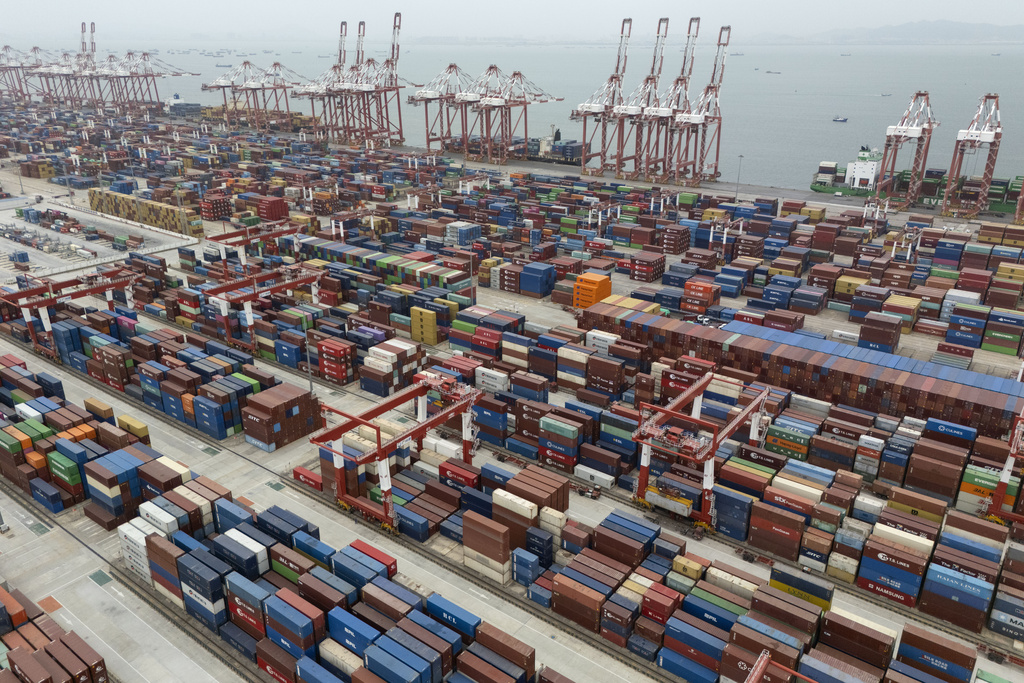A new report from the governor’s office not too surprisingly found that this year’s tariff wars between the U.S. and the rest of the world “will likely lead to worse economic outcomes” for Coloradans and the state’s economy.
If all of the threatened tariffs go into effect as planned, Colorado’s effective tariff rate will jump to 21% compared to last year’s 3%, according to the Office of State Planning and Budgeting report issued Thursday. The estimate was based on current and planned tariffs as of Aug. 12.
“This detailed report makes clear what Colorado families are already feeling: Trump’s tariffs are a tax on hardworking people and businesses that hurts our economy and state,” Gov. Jared Polis, a Democrat, said in a news release. “From groceries to housing to health care, Coloradans are sadly paying more because of the President’s reckless trade war.”
The Trump administration’s trade war started with a bang in early April, when double-digit reciprocal tariffs were added to imports from dozens of countries. The news also tanked the stock market, which has since recovered. Most tariffs were paused within days, and some countries negotiated for lower rates. However, new tariffs on about 90 countries took effect last month.
In July, Polis ordered several state agencies to dive into the impact of higher taxes on trade to get a more comprehensive view of how this will impact the state’s economy.
Beyond the higher taxes to be paid by local businesses who import or export, there is the downstream impact on incomes, business revenues, sales and use taxes and jobs.
Based on the tariffs as of Aug. 12, retail sales are projected to fall for the next three years in Colorado. Compared to 2024, the forecast is for retail sales to drop 1.5 percentage points this year, 1.8 points next year and 1.4 points in 2027 as consumers put purchases on hold or buy less.
It’s also become more challenging to find a new job in the state, and the uncertainty employers face with tariffs won’t help. Job growth is expected to slow even more quickly, while unemployment rates will increase faster in the current tariff scenario.
“Tariffs are expected to slow economic activity by weakening consumer demand, which will result in lower spending, falling business profits, slower wage growth, and a weaker asset market. Subsequently, these impacts on the economy will result in lower state revenue collections, primarily by reducing individual income, corporate income, and sales tax revenue with other more modest impacts, as well,” the report said.
All that would impact the state budget, too. In the current tariff scenario, the state’s general fund would collect $241.1 million less in revenue for the current fiscal year, or a 1.4% drop. An escalated tariff schedule translates into steeper losses of $440 million this fiscal year, which ends June 30, and $805 million next fiscal year.
Colorado’s trade
Last year, Colorado exported a record $10.5 billion worth of goods out of the country. The state’s primary exports were meat, industrial components and electronic machinery.
The state imported $17 billion last year, with nearly half coming from the state’s top three trade partners, Canada, Mexico and China.
Past trade agreements with Canada and Mexico mean that eligible goods are mostly exempt from the higher taxes. For China, there’s essentially a new 30% tariff.
Other tariffs hadn’t gone into effect yet when the report wrapped up. That includes the 50% tariff on goods from India, which went into effect Aug. 27.
India is not among Colorado’s top 10 export partners but ranks ninth for imports, which is where those U.S. reciprocal tariffs come into play. Such escalating tariffs would push Colorado’s rate to 25.5%.
The report also pointed out that different goods have different taxes added. Foreign-made cars and trucks have a 25% tariff, while metals like steel, aluminum and copper are at 50%. All those will impact construction, housing and development. Some countries did negotiate with Trump for lower rates, the report also noted.
But regardless of the on again, off again U.S. tariffs, the report said the impact will damage the state’s economy.
“In short, currently implemented effective tariff rates are 7 to 8 times higher than those faced last year, with additional risk if escalation occurs,” the report said.
Tariffs have been an ongoing crisis all year for local companies that rely on imports or exports.
The Colorado Chamber of Commerce was still reviewing the report and pointed to a statement that CEO Loren Furman made in April: “We’re concerned with any policy that disrupts predictability in the market or increases the cost of doing business — whether that comes from the state or federal government.”
World Trade Center Denver, which helps businesses find new international markets, is hosting another workshop for businesses today that need help strategizing on how to mitigate tariffs. But the session is full, CEO Karen Gerwitz said.
“The tariffs are a major concern for Colorado businesses,” Gerwitz said, “and we at the World Trade Center Denver are fielding questions daily about them and the ever-changing nature of trade policy.”
This is a developing story and may be updated.
Based on facts, either observed and verified directly by the reporter, or reported and verified from knowledgeable sources.
